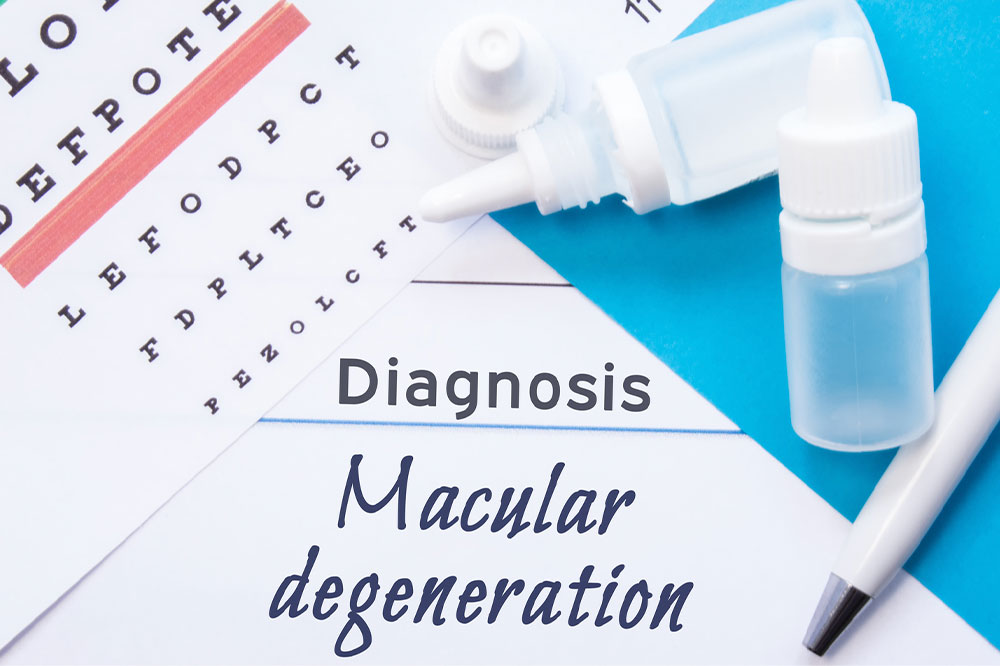Macular Degeneration – Causes, Symptoms, and More

Macular degeneration is a progressive disease that destroys the macula, the part of the eye that allows you to see fine details. It can make activities like reading, writing, and driving difficult or impossible. The disease typically occurs in older adults and can lead to blindness. While macular degeneration can be managed in its early stages, it has no cure. This article discusses the causes, risk factors, symptoms, and treatments of macular degeneration.
What is macular degeneration?
Macular degeneration is a disease of the retina, the light-sensitive layer at the back of your eye.
There are two types of macular degeneration: dry and wet. The former develops when the macula dries out and loses its function. Wet macular degeneration is a result of new blood vessels under the retina leaking fluid or blood, causing vision loss.
Symptoms of macular degeneration
The symptoms of macular degeneration can develop differently in individuals, but here are the typical signs one must note. One of the main symptoms is a gradual loss of central vision, which can progress over time and may not be noticeable at first. Additional symptoms are difficulty reading small print or close-up objects, trouble seeing in dim light or when looking up from a low angle, problems with depth perception and peripheral vision, and poor night vision. People might also experience changes in color discrimination, a difficulty distinguishing between colors. In advanced stages, one might face difficulty recognizing faces, trouble with distance vision and finding things in your home or office.
Causes of macular degeneration
The condition can be a result of a combination of causes or due to one specific reason.
Age
Our eyesight gradually declines as we get older. This occurs as the lens loses its ability to focus on objects both close up and far away.
Genetics
Some people are more likely than others to develop macular degeneration. The exact cause is not clear, but it may be due to specific genes or exposure to environmental factors when you were younger.
Health conditions
Other health conditions – like diabetes, hypertension, and high cholesterol – can also lead to macular degeneration if they’re not treated properly.
Complications associated with macular degeneration
Macular degeneration can lead to several complications. These include an increased risk of depression, social isolation, visual hallucinations, and Charles Bonnet syndrome.
Depression is a common complication associated with macular degeneration because vision loss can be tough to adjust to. People with macular degeneration can also begin to isolate socially. It can be challenging to stay connected with friends and family when you can no longer see them clearly. Visual hallucinations are also possible, as the brain tries to make sense of the blurred or missing vision. Finally, Charles Bonnet syndrome is a condition that can cause people to see things that are not there.
It is essential to be aware of these potential complications so that you can seek help if needed.
Diagnosis of macular degeneration
Your doctor can recommend several tests to diagnose macular degeneration accurately, such as:
Several tests can be used to diagnose macular degeneration, but the two most commonly used diagnostic methods are Fluorescein Angiography and Optical Coherence Tomography (OCT).
Fluorescein angiography is a procedure that uses dye to visualize the blood vessels in your retina. This allows doctors to determine whether there is damage to your macula or not.
Optical Coherence Tomography (OCT) uses light waves to create detailed images of the inside of your eye. This technique is often used together with fluorescein angiography to provide a complete picture of the condition of your retina.
The Indocyanine Green Angiography (ICG) test uses a dye that travels through your bloodstream and shows how well your central vision works. ICG can help diagnose the early stages of macular degeneration and may be able to save your eyesight if it’s caught in time.
It is recommended to test for any changes in your central vision, which measures how well you see objects in the middle distance and may help determine whether you have early-stage macular degeneration.
Treatment of macular degeneration
There are many treatments for macular degeneration, but all of them involve some combination of low vision rehabilitation, vitamin supplements, and implant surgery for the telescopic lens.
Low vision rehabilitation
This is the most crucial part of treatment for macular degeneration. Rehabilitation helps people learn how to use their remaining sight more effectively. It may entail learning to read Braille or using a magnifier, as well as techniques such as using an adaptive computer system or collaborating with a personal assistant.
Vitamin supplements
Macular degeneration can cause significant deficiencies in certain vitamins and minerals, leading to further vision loss. Supplements such as beta carotene or zinc help restore these levels and improve overall health.
Implant surgery for telescopic lens
If low vision rehabilitation isn’t successful enough, implant surgery may be necessary to provide better visual access. This involves surgically inserting an artificial lens into the eye so that people with macular degeneration can see again.
Risk factors of macular degeneration
Multiple risk factors are associated with macular degeneration, including age, weight, hypertension, and family history.
You are more likely to develop macular degeneration if you are over the age of 50. As we age, our eyesight naturally begins to decline, putting us at greater risk of developing this condition.
If you have excess weight or hypertension, your chances of developing macular degeneration are even higher. Family history is also a significant risk factor; if someone in your family has been diagnosed with the condition, you have a greater chance of developing it yourself.
There is no cure for macular degeneration once it develops. However, treatments available can help slow its progression and preserve vision. If you risk developing macular degeneration, talk to your doctor about ways to reduce your risks and protect your vision.
How to manage macular degeneration?
It is imperative to maintain a healthy BMI if you have conditions such as macular degeneration. It is believed that excess weight can increase your chances of developing this eye disease by up to 50%. Instead, eat healthy meals and avoid trans-fat-rich foods, red meat, and carbonated drinks.


